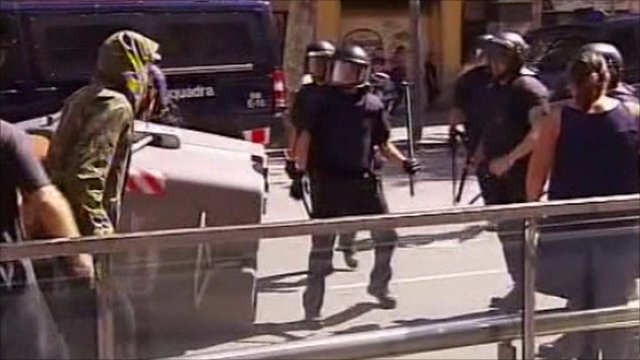 Tens of thousands of people from around Europe have marched across Brussels in a protest against spending cuts by some EU governments.
Tens of thousands of people from around Europe have marched across Brussels in a protest against spending cuts by some EU governments.
Spain has held a general strike, with protesters in Barcelona clashing with police and torching a police car.
Other protests against austerity measures have been held in Greece, Italy, the Irish Republic and Latvia.
Trade unions say EU workers may become the biggest victims of a financial crisis set off by bankers and traders.
Many governments across the 27-member bloc have imposed punishing cuts in wages, pensions and employment to deal with spiralling debts.
In Greece and the Irish Republic, unemployment figures are at their highest level in 10 years, while Spain's unemployment has doubled in just three years.
In Britain the government is planning to slash spending by up to 25% in some areas, while France has seen angry protests against a planned increase in the minimum retirement age.
Firecrackers
Police sealed off the EU headquarters and barricaded banks and shops ahead of the protest in Brussels. It was described by unions as a day of action under the slogan "No to austerity, priority to jobs and growth".
Tens of thousands of demonstrators, many carrying large red and green balloons and banners, headed towards EU institution buildings in the Belgian capital.
They made heard their voices, whistles, horns and anything else they could find, says the BBC's Nick Childs in the city, amid the sound and smoke of firecrackers.
Speaking at the march, Jean Claude Mailly, head of the French union Force Ouvriere, said there was still time to rethink the austerity measures.
"It is never too late because the austerity measures are in the process of being set up now," he told the BBC.
"So we are in a period where social movements of a different nature will have a big value in the weeks and months to come. There is a strong social tension."
Labour unions in Spain began the country's first general strike in eight years by marching through the capital, Madrid, in an effort to shut down the city.
Also in the capital, there were mass protests outside bus and metro stations, and few buses were running. Many high-speed trains were cancelled and only about a quarter of commuter trains were running.
Groups of strikers went into shops and banks trying to force them to close.
The airline Iberia said it expected to operate only 35% of scheduled flights.
'Banks to blame'
In the Irish Republic, a man drove a cement mixer covered with anti-bank slogans into the gates of the parliament in Dublin, in an apparent protest at the country's expensive bank bail-out.
The European Trade Union Confederation (Etuc) said the protesters were marching to voice their anger over budget-slashing plans and cuts which "could lead Europe into a recession".
The union warns that the financial crisis - which it describes as the worst in Europe since the 1930s - has already made 23 million people across the EU jobless. It fears that the austerity measures being implemented by various EU governments could "result in even more unemployment".
"We didn't cause this crisis. The bill has to be paid by banks, not by workers," Etuc said.
Instead, the organisation urges governments to guarantee workers stable jobs, strong social protection and better pensions.
Workers in many EU countries are frustrated that they are paying for the mistakes of the banks and the financial sector, the BBC's Christian Fraser in Brussels reports.
The recovery is still fragile. In some countries it has not even begun, and many fear the cuts could provoke further trouble, our correspondent says.
He adds that in short, it is a debate on austerity versus stimulus, cuts or spending, and the opinions are deeply and bitterly divided.



